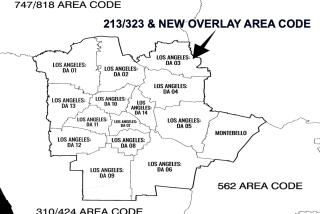PUC Votes to Keep 818 Area Code Intact
- Share via
In a show of support for its newly adopted number-conservation program, the state Public Utilities Commission voted Thursday to keep the 818 area code intact, instituting a split only after all available phone numbers are exhausted.
The commission’s action, approved on a 3-2 vote, marks the second time in less than a month that the commission has adopted number-conservation measures over a split or overlay.
Commissioners first asserted their broader powers granted by the Federal Communications Commission when they voted Sept. 16 to kill the 424/310 overlay on the Westside and instead enforce several complex area code preservation plans.
At Thursday’s session, commissioner Joel Z. Hyatt said his proposal answered cries for reform from consumers and politicians, including state Sen. Richard Alarcon (D-Sylmar), Assembly Speaker Antonio R. Villaraigosa (D-Los Angeles) and Assemblyman Wally Knox (D-Los Angeles).
“We have witnessed a public uproar that said, ‘You have inconvenienced us in an important aspect of our lives,’ ” Hyatt said. “They concluded, and I agree, that industry indifference, government inefficiency and regulatory complacency were not sufficient justification for change.”
Hyatt’s proposal called for a 818 split, but only after all number-conservation measures are exhausted. An area from Chatsworth to Glendale would keep 818, while communities from Agoura Hills to Van Nuys would get a new area code.
Hyatt said he received assurances from industry executives that they will comply with state regulators’ orders to preserve area codes as long as possible.
“I have unqualified commitment from telephone companies to make it happen,” he said. “They will not be obstructionists; they will be cooperative.”
Still, commissioner Josiah Neeper rejected Hyatt’s plan and pushed his own proposal calling for an overlay.
Under Neeper’s plan, all new numbers in 818 would get a new--as yet undetermined--area code, while existing numbers would keep the old one. But all callers would have to dial 11 digits for local calls, a requirement that triggered a furor among business owners and residents on the Westside and in the South Bay.
Additionally, Neeper questioned the legality of instituting number-conservation measures rather than a split or overlay.
“Anything beyond a split or overlay is not permitted,” he said, “and to act as though depletion of numbers has not occurred is wrong.”
Hyatt countered that the recent FCC decision gave state utilities regulators the legal authority to more tightly ration phone numbers and force phone companies to return unused numbers.
Commissioner Henry Duque put forth a third proposal seeking an immediate 818 split, arguing that number-conservation would take too long to slow demand for new numbers in the calling area.
“818 has had a full life of 15 years,” Duque said. “It is possible to split the area along clear boundaries, and it’s preferred by customers.”
Joining Hyatt in voting for the split plan were commissioners Carl Wood and Richard Bilas. Neeper and Duque voted against the plan.
To preserve the 818 area code, PUC analysts must now examine phone companies’ books to determine whether all available numbers have been exhausted in 818.
They will also reduce the amount of phone numbers given out at a time from 10,000 to 1,000 and reclaim unused numbers and place them in a single pool for redistribution.
Regulators, consumer advocates and industry leaders acknowledge that they don’t know how effective the measures will be in keeping area codes intact.
Still, industry representatives say they will not challenge the PUC’s authority.
“For us, it has always been about customer convenience,” said Steve Getzug, a spokesman for Pacific Bell. “Just as with 310, we will do our part to follow the PUC’s decision and hope all other carriers will do the same.”
More to Read
Sign up for Essential California
The most important California stories and recommendations in your inbox every morning.
You may occasionally receive promotional content from the Los Angeles Times.













